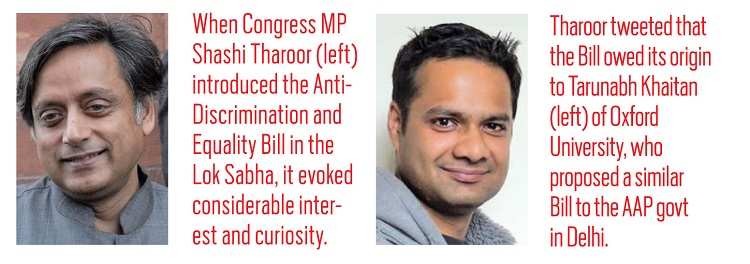
A Private Member’s Bill by Shashi Tharoor promises remedies against all sorts of discrimination. But will it be passed in parliament?
~By Venkatasubramanian
Private Members’ Bills (PMBs)—those presented by Members of Parliament other than ministers—have a very poor record of seeing the light of day. Between 1952 and 1968, while 14 PMBs became laws, between 1968 and 2014, none of the PMBs were enacted. In 2014, the Rights of Transgender Persons Bill, a PMB, was introduced by DMK MP Tiruchi Siva. The government adopted the Bill, with changes, and passed it in 2016.
The reason the government cites for non-passage of a PMB is that it would come up with a better bill or that the bill’s concerns are already addressed in the existing laws. Therefore, when Congress MP Shashi Tharoor introduced the Anti-Discrimination and Equality Bill in the Lok Sabha on March 10, it evoked interest and curiosity.
In the 14th Lok Sabha, 328 Private Members’ Bills were introduced, but only 14 were discussed. If Tharoor’s Bill provokes a debate in parliament and outside, it must be due to its merits. The chief merit is that it extends prohibition of discrimination on grounds of religion, race, caste, sex or place of birth, and those not mentioned in Article 15(1) by the State to similar discriminative acts by non-State private entities.
WIDE SPECTRUM
A “protected characteristic” in relation to a citizen of India is defined in the Bill as “caste, race, ethnicity, descent, sex, gender identity, pregnancy, sexual orientation, religion and belief, tribe, disability, linguistic identity, HIV status, nationality, marital status, food preference, skin tone, place of residence, place of birth or age”. Based on this definition, the term “disadvantaged group” is given a wider meaning, which includes any group which suffers untouchability, racial and ethnic minorities in the relevant geographical area, women and inter-sex persons, transgendered persons, hijras and gender non-conforming persons.
 Thus, the Bill’s ambit includes situations when an employer refuses to interview a candidate because he belongs to a scheduled caste or when an employer fires a female employee after her marriage because he makes a stereotypical assumption that married women do not make efficient workers. A hospital which hires only female nurses based on the stereotypical assumption that women are more caring than men or a housing society which offers apartments on rent only to married couples would attract the rigours of the Bill. If a university has a policy of conducting random security checks of rooms of only Kashmiri students, it too is likely fall foul of this Bill.
Thus, the Bill’s ambit includes situations when an employer refuses to interview a candidate because he belongs to a scheduled caste or when an employer fires a female employee after her marriage because he makes a stereotypical assumption that married women do not make efficient workers. A hospital which hires only female nurses based on the stereotypical assumption that women are more caring than men or a housing society which offers apartments on rent only to married couples would attract the rigours of the Bill. If a university has a policy of conducting random security checks of rooms of only Kashmiri students, it too is likely fall foul of this Bill.
Creating an intimidating, hostile or bullying environment for a person of a protected group is deemed as harassment and would invite penal action under the Bill. Thus, a co-worker sprinkling “holy water” on a machine previously operated by a Dalit colleague would be deemed harassment under the Bill.
A khap panchayat ordering villagers to stop all interaction with the families of a couple who belong to different religions would be considered boycott in relation to religion-cum-marital status, again attracting the penal provisions of the Bill. Threatening a Hindu boy with violence unless he breaks off his romantic relationship with a Muslim girl would also be considered an offence under the Bill.
MORAL BRIGADE
The Bill targets the moral brigade’s bid to force a woman walking hand in hand with a man who is not married to her to tie a rakhi on the man’s wrist. A woman in love with a man belonging to the same gotra as hers, but finds her movements restricted and monitored by her family, could also get relief from the Bill.
Tharoor’s Bill reasoned that instead of merely mandating punishment for offences, we must simultaneously engender greater understanding and empathy within the system among the individuals who constitute that system. “India is at present an exception among liberal democracies for not enacting a comprehensive law against discrimination, covering both the public and the private sectors,” the Bill noted.
Tharoor tweeted that the Bill owed its origin to the efforts of Tarunabh Khaitan, who is an Associate Professor and the Hackney Fellow in Law at Wadham College, Oxford University, UK. Author of “A Theory of Discrimination Law” (OUP 2015), Khaitan had proposed a similar Bill to the Delhi government last year. The AAP government, which initially showed interest in its adoption, backtracked for inexplicable reasons. Khaitan has expressed the hope that the Lok Sabha will now send the Bill to a standing committee for scrutiny.
One of the key features of this Bill, according to Khaitan, is that discrimination is normally seen as a civil rather than a criminal offence. The focus is on compensation and redress for the victim, rather than punishment for the discriminator. The usual modes of enforcement of civil court orders will apply for non-compliance. The only departure from the civil nature of the Bill is that there are some special provisions for aggravated discrimination where a magistrate can be approached for a protection order.
The Bill mandates the formation of Central and State Equality Commissions to inquire into any matter, seek any information and facilitate the resolution of any dispute or issue any order under the Act.
Whether it will lead to a just and equitable society waits to be seen.

